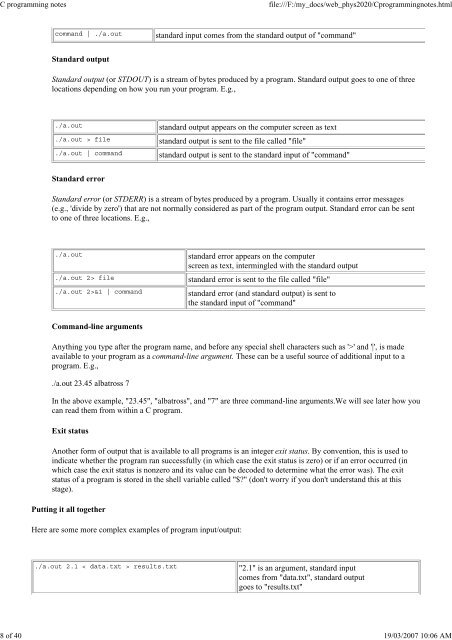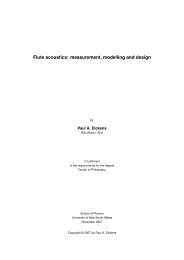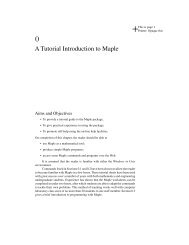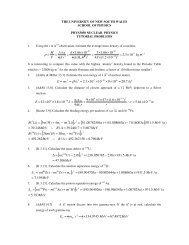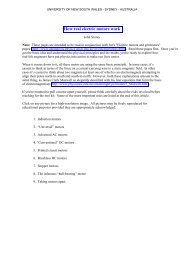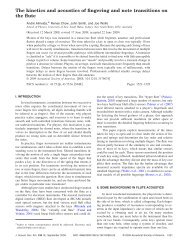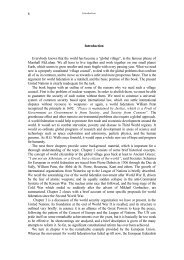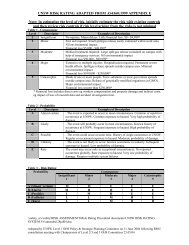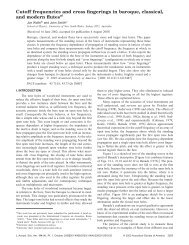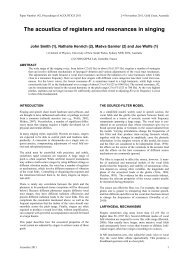C programming notes - School of Physics
C programming notes - School of Physics
C programming notes - School of Physics
Create successful ePaper yourself
Turn your PDF publications into a flip-book with our unique Google optimized e-Paper software.
C <strong>programming</strong> <strong>notes</strong><br />
file:///F:/my_docs/web_phys2020/C<strong>programming</strong><strong>notes</strong>.html<br />
8 <strong>of</strong> 40 19/03/2007 10:06 AM<br />
command | ./a.out<br />
standard input comes from the standard output <strong>of</strong> "command"<br />
Standard output<br />
Standard output (or STDOUT) is a stream <strong>of</strong> bytes produced by a program. Standard output goes to one <strong>of</strong> three<br />
locations depending on how you run your program. E.g.,<br />
./a.out<br />
./a.out > file<br />
./a.out | command<br />
standard output appears on the computer screen as text<br />
standard output is sent to the file called "file"<br />
standard output is sent to the standard input <strong>of</strong> "command"<br />
Standard error<br />
Standard error (or STDERR) is a stream <strong>of</strong> bytes produced by a program. Usually it contains error messages<br />
(e.g., 'divide by zero') that are not normally considered as part <strong>of</strong> the program output. Standard error can be sent<br />
to one <strong>of</strong> three locations. E.g.,<br />
./a.out<br />
./a.out 2> file<br />
./a.out 2>&1 | command<br />
standard error appears on the computer<br />
screen as text, intermingled with the standard output<br />
standard error is sent to the file called "file"<br />
standard error (and standard output) is sent to<br />
the standard input <strong>of</strong> "command"<br />
Command-line arguments<br />
Anything you type after the program name, and before any special shell characters such as '>' and '|', is made<br />
available to your program as a command-line argument. These can be a useful source <strong>of</strong> additional input to a<br />
program. E.g.,<br />
./a.out 23.45 albatross 7<br />
In the above example, "23.45", "albatross", and "7" are three command-line arguments.We will see later how you<br />
can read them from within a C program.<br />
Exit status<br />
Another form <strong>of</strong> output that is available to all programs is an integer exit status. By convention, this is used to<br />
indicate whether the program ran successfully (in which case the exit status is zero) or if an error occurred (in<br />
which case the exit status is nonzero and its value can be decoded to determine what the error was). The exit<br />
status <strong>of</strong> a program is stored in the shell variable called "$?" (don't worry if you don't understand this at this<br />
stage).<br />
Putting it all together<br />
Here are some more complex examples <strong>of</strong> program input/output:<br />
./a.out 2.1 < data.txt > results.txt<br />
"2.1" is an argument, standard input<br />
comes from "data.txt", standard output<br />
goes to "results.txt"


